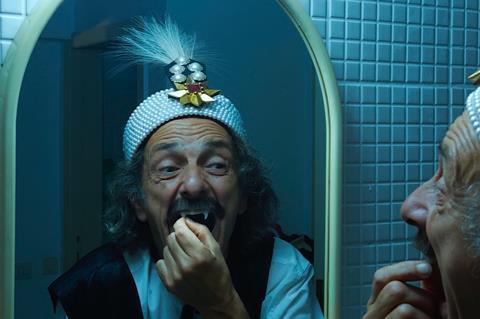The director follows up Berlin Silver Bear-winning Kontinental ’25 with this provocative portmanteau

Dir/scr. Radu Jude. Romania/Austria/Luxembourg/Brazil. 2025. 170mins.
Radu Jude’s Dracula, a character points out, could have been called Frankenstein, as it is stitched from diverse parts — but it is also so raucously farcical in its spoofing of horror iconography that it could easily have been called Carry On Fanging. Yet for all the ribaldry and sometimes knowingly crass provocation, at heart this is a characteristically serious project from the tirelessly inventive Romanian writer/director — a study of the meanings, uses and abuses of the Dracula myth, specifically in its country of origin.
The whole affair keeps reanimating itself with furious, facetious energy
Sex, gore, satire and semiotics combine in a film that expands on the in-your-face spirit of Jude’s 2021 Berlin winner Bad Luck Banging Or Loony Porn and 2023’s Do Not Expect Too Much From The End Of The World, although it is more aggressively over the top than both, baiting audience patience at nearly three hours. It should alternately tickle and perplex horror fans and arthousers alike, and stir debate on its Locarno premiere; at any rate, it is a unique mash-up of cine-philosophy and trash culture in a jugular vein.
The unifying element in this baggy portmanteau is the figure of Vlad ‘the Impaler’ Tepes, aka Vlad Dracul, the 15th-century Wallachian ruler whose ruthless methods inspired Bram Stoker’s novel Dracula — and who has recently become an icon of Romania’s far right. Jude begins by playing off imagery of Vlad (including his famous tufted headdress) against Dracula’s classic caped-aristo look in an opening series of lurid AI-generated images, establishing the film’s register of screw-you profanity.
A young filmmaker (buoyantly camp Adonis Tanta, recently in Jude’s Kontinental ’25) announces to camera that he has been commissioned to make a Dracula film, but is stuck for ideas. Fortunately, AI software is there to help with a project that, he promises, will be crammed with “nudity, sex, feelings”, and “super-commercial”. What follows is a compendium of episodes of varying lengths, interspersed with the misadventures of the actors playing Dracula and his female victim in a restaurant that specialises in tacky horror-themed sex cabaret. She (Oana Maria Zaharia) is a world-weary goth and OnlyFans model; he (Kontinental ‘25’s Gabriel Spahiu) is an ageing, exhausted former mental patient. The duo flee through the scenic cobbled streets of Sighisoara — birthplace of Vlad Tepes, and home to a thriving industry in vampire kitsch — pursued by a bloodthirsty group of role-playing tourists.
A large ensemble cast (including Ilinca Manolache from Do Not Expect Too Much…) play multiple roles as the film runs through variations on horror and history. In one episode, a wealthy woman, seeking eternal life at the clinic founded by real-life Romanian gerontologist Ana Aslan, watches a 1970s historical drama about Vlad Tepes. In another, clips from FW Murnau’s Nosferatu are cut with adverts for penis enlargement and other products, while moments from Francis Ford Coppola’s Dracula are faked by AI in a grotesque sexual fantasmagoria. Longer sequences include an adaptation of a 1960s Socialist romance (even here, impaling plays a part), while a raunchy comic tale from the 1870s might be best described as anti-clerical folk porn.
The film’s political seriousness is especially evident in two episodes. One adapts a 1930s Romanian vampire novel, with Tanta as a gauche young scholar who encounters a vampire — a cloaked, big-nosed figure resembling a large Sesame Street puppet. Pushing the theatricality to the max, this episode ponders on the uses of the Dracula myth as a means of social control. Another extended story offers a variant on Karl Marx’s depiction of capitalism vampirising proletarian labour. Here, Vlad Tepes runs a sweatshop of videogamers whose scores are sold to the wealthy; their eventual revolt is bloodily suppressed by an army of AI zombies.
It is redundant to complain that Jude’s film is overstated — that is entirely the point — although some of its excesses are laboured, and some gags just not that funny. But the whole affair keeps reanimating itself with furious, facetious energy. Alongside references to Heidegger, Wordsworth, the physicist Ludwig Boltzmann and figures from Romanian history, ancient and modern, this Dracula is also very contemporary, with its references to online culture and its use of AI to generate mind-boggling animated and still imagery. Indeed, the cutting-edge lavishness of this technology is in startling contrast with the manifestly DIY execution of the rest, with regular Jude DOP Marius Panduru shooting on iPhone to sometimes abrasively grungy effect.
Production companies: Saga Film, RT Features
International sales: Luxbox, info@luxboxfilms.com
Producers: Alexandru Teodorescu, Rodrigo Teixeira
Cinematography: Marius Panduru
Production design: Andreea Popa
Editing: Catalin Cristutiu
Music: Wolfgang Frisch, Hervé Birolini, Matei Teodorescu
Main cast: Adonis Tanta, Gabriel Spahiu, Oana Maria Zaharia, Andrada Balea
























